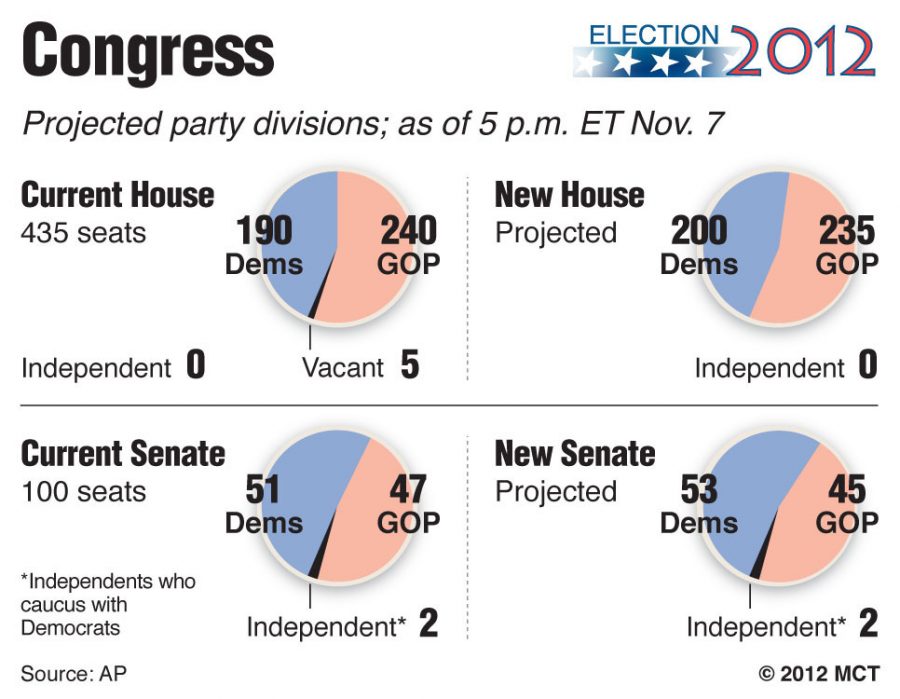Editors Perspective: Congressional Elections Effect
Graphic shows current balance of power in the U.S. House and Senate and pie charts showing projected balance of power as of 5 p.m. ET Nov. 7. MCT 2012 –Courtesy of MCT Campus
November 8, 2012

With the historic re-election of our 44th President Barack Obama, the country has the opportunity to usher in a new era of bipartisanship and compromise that a majority of the country yearns for. However, despite President Obama’s victory and Congress’ low approval ratings, the United States Congress remains largely unchanged.
The Democrats were able to pick up two seats in the U.S. Senate while Republicans maintained strong control of the House of Representatives. This means that many important issues such as the fiscal cliff and immigration reform will be decided by another polarized and divided Congress.
Many citizens have been frustrated and dismayed by the lack of bipartisanship and work accomplished in the 112th Congress, which is set to finish off with an approval rating under 13 percent. Who knew such low approval ratings would still result in a high number of incumbent congressional re-election triumphs?
In the Senate, Majority leader Harry Reid (D-NV) and Minority leader Mitch McConnell (R-KY) have been leading their parties down a path of heightened partisanship which has resulted in more of the gridlock that the public dislikes. The House of Representatives has also been a catastrophe this Congress with many 2010 victorious Tea Party candidates rendering compromise impossible.
Now that the general elections are out of the way, Congress faces the challenge of dealing with the potentially disastrous metaphorical “fiscal cliff” which takes effect January 1, 2013 if they fail to act. Going over the fiscal cliff involves increasing tax rates across the board and dramatically cutting government spending on defense. This result could lead to job losses and higher unemployment. Back in 2011, President Obama and Speaker of the House John Boehner (R-OH) attempted to construct a “Grand Bargain” which would cut the deficit by reducing federal spending and adding tax revenue to go with it.
Nonetheless, the Grand Bargain, which failed to pass in 2011, must not be duplicated this time around. Our country, which continues to face massive deficits and unemployment above 7 percent, must persuade Congressional representatives and senators to come up with a balanced approach to solve these problems. The time for bickering and divisiveness among the two parties has ended; now is the time for real compromise and reform.
To begin this, Congress should pass the “Simpson-Bowles” debt reduction plan which was created by National Commission on Fiscal Responsibility and Reform and was established by the president back in 2010. It is a bipartisan plan which was formed by members of both parties and deals with balancing the budget, slowing down the growth of entitlements and cutting the deficit.
Another issue in need of major reform is immigration. The 2012 General Election displayed why the Republican Party is on the wrong side of our country’s demographics. President Obama won 70 percent of the Hispanic vote in large part due to the Republican Party’s “no way or the highway” stance on immigration and the Dream Act. In the 113th Congress, members on both sides of the aisle must realize that the Hispanic population is the fastest growing demographic in the nation and are going to continue voting in high numbers for the party that reflects their beliefs. Hispanic voters indicated that economic fairness and the opportunity to achieve the American dream of growth and prosperity were very important in deciding who to support.
Although Congress will remain divided next year when the new members of the Senate and House of Representatives are inaugurated, bipartisanship and compromise must be attained in order to solve the fundamental problems facing our nation. It is essential that the 113th Congress aim to improve where this past Congress failed so profusely.




This guy • Feb 12, 2013 at 12:09 pm
I’ve been surfing online greater than three hours nowadays, but I by no means discovered any attention-grabbing article like yours. It’s pretty worth sufficient for me. In my view, if all website owners and bloggers made excellent content as you probably did, the web will likely be much more helpful than ever before.